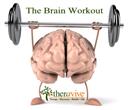December 24, 2017
by Christie Hunter

A New Year has arrived and with a New Year comes new hopes and dreams just bursting to be fulfilled. Losing weight, quitting smoking, and getting healthy are by far the most popular resolutions. And yet the attainability of a resolution has become virtually impossible to achieve for most people. Breaking down goals into pragmatic parts results in more successful outcomes.
[More]
March 17, 2016
by Anne Kip Watson

Fifty years of research on depression may have done a disservice to people aiming to move out of the dumps and into a happy state of mind.
[More]
November 14, 2014
by David Porter, MA

Writing in a journal, or journaling, can serve as a valuable adjunct to psychotherapy. Keeping a journal is useful to gain and maintain perspective, to process stressors, generate ideas, and recognize functional and dysfunctional patterns in one's life. A journal can be a place for you to vent your emotions, and to take some private time every day to reflect on your life (Bodeeb, 2014). Journals can be used to record changes and milestones in life, and can also be passed on to the next generation as a part of family history.
[More]
October 16, 2013
by Ashley Marie

When it comes to someone with obsessive-compulsive behaviors, the line between enabling and acceptance can be blurred. Here are some valuable insights into helping someone you love who may exhibit OCD.
[More]
Stress is a daily reality for most of us. Mindfulness is an effective therapeutic way to help calm yourself and find peace.
[More]
July 31, 2013
by Ashley Marie

Learning to speak another language takes time and effort, but the benefits outweigh the costs.
A new language can grant you access to a new culture, open your mind to fascinating literature, allow you to explore a faraway city, and view the world from a different perspective.
By learning Portuguese, you can learn to dance to Bossa Nova like an authentic Brazilian. By learning German, you can let your heart be moved by Mozart’s Singspiele. By learning French, you can read through first editions of Rousseau’s political theories. By learning Japanese, you can learn how to make authentic sushi. With more than 6,000 languages to choose from, your options are endless.
Studying a foreign language not only enriches the quality of your life; it also improves the quality of your brain.
Enhance Your Cognitive Skills
In today’s competitive job market, it is essential to maximize your brainpower. Not only is speaking a second language often an advantage in the marketplace, but it can also improve the quality of your thinking.
A study conducted at the University of Kentucky College of Medicine revealed that bilingual individuals could multitask faster than those who were monolingual.[1] Moreover, MRI scans showed that bilinguals used their brainpower more effectively.
This research involved senior citizens, thereby showing that bilingualism has long-term benefits. By actively switching between languages throughout their lives, bilinguals tend to develop better cognitive flexibility.
Researchers have also found that children in multilingual schools tend to perform better academically.[2] They even demonstrate a greater ease when studying music and math – both of which involve a new way of thinking, a new language
For therapists, this means that learning a second language can actually improve your ability to think through complex psychological issues.
Increase Your Sympathy
According to Lynch, multilingual children tend to display social sympathy before monolingual children.[2] This is because multilingual children come to understand differences in perspective faster. They learn that their Italian-speaking friend might see the world differently than their Spanish-speaking friend, because they recognize differences in communication and culture.
Moreover, multilingual children learn early on that they are not at the center of the world; rather, they are part of a complex society embedded with a multitude of tongues, expressions, dialects, cultural norms, and habits.
When dealing with mental health issues, therapists need to sympathize with others, to be attentive listeners, and to try to understand where another person is coming from. The words someone chooses to tell his or her story are rich with meaning; they can help reveal his or her thought patterns, cultural heritage, and understanding of life.
We all have unique personal stories, and it is often a challenge to communicate our past and present to another person, especially to a complete stranger. As such, therapy sessions should provide an open space that allows a client to express himself or herself fully. Therapy should give birth to a constructive dialogue that helps a client in a profound way, so that they can face the challenges that lay before them.
Engage with the 21st Century
Only 1 in 5 American students between Kindergarten and grade 12 study a second language at school.[3] However, it has become increasingly important to learn a language other than English.
So, which language should you learn? Below are three suggestions, but by no means are they the only languages to consider learning.
French
French is the official language of 29 countries around the world, including, for instance, France, Canada, Switzerland, Senegal, Monaco, Luxembourg, Burundi, among many others. It is also the official language of the United Nations.[4] Especially for Canadian therapists, the French language can grant you access to a whole new demographic.
Spanish
For American therapists, Spanish is a highly beneficial language to learn, especially for those who work in New Mexico, Texas, and California. Health professionals and social workers are often encouraged to learn Spanish, as it allows them to communicate with Spanish-speaking patients and clients[5]. Worldwide, there are 322 million people who speak Spanish. It is also the official language of 21 countries, such as Chile, Colombia, Argentina, Spain, Panama, Peru, and Mexico.
Chinese Mandarin
Chinese Mandarin ranks first as the most spoken language, with 837 million speakers worldwide. Though it is only the official language of three countries – China, Singapore, and Taiwan – it is spoken in cities across the globe. After English, Chinese is considered to be the most useful language for business.[6]
Learn a Language, Build Your Practice
Learning a second language is an enriching experience. And for a therapist, it can be a wise way to expand your practice. Consider the benefits of offering counseling in more than one language. As our world becomes increasingly globalized, multicultural, and multilingual, take advantage of the opportunity to immerse yourself in a new way of thinking, a new way of communicating, and a new way of doing therapy.
[1] Bates, C. January 9, 2013. Très bien! Speaking two languages from childhood keeps brain in good shape as we age. [online] Available at: <http://www.dailymail.co.uk/health/article-2259469/Speaking-languages-childhood-keeps-brain-good-shape-age.html>
[2] Kluger, J. April 23, 2013. Understanding How the Brain Speaks Two Languages. Time. [online] Available at: < http://healthland.time.com/2013/04/23/bilingualism/>
[3] 21st Century Skills Map. Partnership for 21st Century Skills. [online] Available at: < http://www.p21.org/storage/documents/Skills%20Map/p21_worldlanguagesmap.pdf>
[4] 2013. Want to Learn a Language? Here Are the Top 5 Choices. College Stats. [online] Available at: <http://collegestats.org/articles/2013/04/want-to-learn-a-language-here-are-the-top-5-choices>
[5] Crouse, D. 2013. Languages for Specific Purposes in the 21st Century. [online] Available at: < http://www.actfl.org/sites/default/files/pdfs/TLE_pdf/TLE_Apr13_Article.pdf>
[6] Lauerman, J. August 30, 2011. Mandarin Chinese Most Useful Business Language After English. Bloomberg. [online] Available at: <http://www.bloomberg.com/news/2011-08-30/mandarin-chinese-most-useful-business-language-after-english-1-.html>
July 24, 2013
by Ashley Marie

The last article in our series on brainpower addressed the relationship between diet and mental capacity. But eating your way to a smarter brain is not enough.
You should also actively exercise your brain muscles. In the same way that you might go for a jog to tone your legs, you should also give your brain a workout to sharpen your thinking.
Benefits of Brain Exercises
In a fascinating study on cognitive training for the elderly, Ball et al.[1] found that brain exercises can actually decrease the cost of health care by helping to prevent mental illnesses, such as dementia. Mental training can even lessen the need for nursing homes for aging populations.
Participants of the study were divided into four groups. They were then tested in a variety of areas, such as verbal memory, problem-solving skills, and visual memory.
Almost a year later, three of the four groups of participants were given mental training exercises and then subjected to more tests.
The results of the study revealed that the majority of participants who received cognitive training actually enhanced their brainpower.
Executive Reasoning
The aging population is especially prone to losing or slowing down their executive reasoning skills.[2]
The executive part of your brain is found at the front of your head, just above your eyes.
Executive cognitive skills include the ability to problem-solve, even when the variables of a question are changed. Strong executive thinkers are able to examine complex data, as well as provide logical interpretations of their conclusions. They are also able to foresee how current data could affect the future. Entrepreneurs, for instance, excel at determining how to make a company grow and succeed.
A great way to prevent the loss of executive thinking is to test your mind with new sets of problems. By challenging your brain with the unfamiliar, you are able to keep your mind young.
Similarly, young children can develop their thinking skills depending on the toys that they play with. Toys that show a relationship between cause and effect teach them to trace patterns. For instance, a child will learn that if he or she throws a ball in the air, it will go up and eventually fall back down.
Executive Reasoning Exercises
There are several brain exercises available online – many of them for free.
For your convenience, below is a list of my favorite exercises. You can easily incorporate these into your daily routine to keep your mind active and alert throughout the week.
On Your Phone
Simple Brain Workout
Download here
You can easily install this app onto your iPhone or Android. It includes four brain exercises that help you enhance your memory retention and ability to focus. You can even keep track of your progress along the way. If you enjoy a healthy competition, then you are welcome to post your scores and view those of others around the globe.
30-Second Brain Training
Download here
Are you having a busy week and want a quick 30-second brain booster? These games are only 30s long each. Your score also indicates the health of your brain, depending on your results. This app allows you to test your skills to observe data, retain information, and perform mathematical calculations. You can try the General Test for a quick analysis of your thinking skills.
Math Workout
Download here
Are you tired of pulling out your calculator every time you’re buying groceries or calculating your expenses? The creators of this app claim that a daily 5-minute math workout for 7 days will improve your executive thinking skills. This game is suitable for all ages. Moreover, you can participate in a worldwide math competition and review your progress with charts and data.
On Your Computer
Über Brain
Click here
This colorful and interactive game tests the five major parts of your brain, including (1) memory retention, (2) logical reasoning, (3) concentration skills, (4) language skills, and (5) visual memory. Based on your performance, the game provides recommendations on how to maximize your brain workouts. It also tracks your progress for each of the five areas. Create an account for free to find out the best brain regimen for you.
In Your Family Room
Chess
A game of chess is not only a fun way to interact with a friend or family member.[2] It is also a great brain workout. Playing chess can increase your IQ, help decrease the chance of Alzheimer’s, exercise both your left and right brain, enhance your memory retention, sharpen your problem-solving skills, and improve your understanding of cause and effect.
Keep Your Mind Active
It is easy, quick, and fun to improve your brainpower. Even better, you can exercise your brain without spending a penny. There are more advantages than disadvantages to beginning your brain workout. Training your brain for a few minutes today is a long-term investment in tomorrow.
[1] Ball, K. et al. 2002. Effects of Cognitive Training Interventions With Older Adults. JAMA. Pp. 2271-2281 [online] Available at: <http://jama.jamanetwork.com/article.aspx?articleid=195506>
[2] Bragdon, AD. 2011. Brain Games: Brain Teasers, Logic Tests, and Puzzles to Exercise Your Mind. New York: Skyhorse Publishing.
[3] 2013. 10 Big Brain Benefits of Playing Chess. Chess Vibes. [online] Available at: <http://www.chessvibes.com/reports/10-big-brain-benefits-of-playing-chess>
The origins of Thanksgiving have nothing to do with a bunch of Indians and pilgrims sitting down for a bountiful feast of turkey. In reality although the settlers with pale faces had been bothering the Indians in addition to giving them many new diseases they had never had were starving by this time. The Indians took pity on them and brought them some corn and fish. Thanksgiving has a lot of emotional disappointment and this article will show you how to deal with this.
This is a period of time in which you are expected to give to others and be generous. Although the intention is good it often leads to self sacrifice and disappointment. This is a period of time in which you must balance your newfound humanitarianism with the demands on your own life. If you do not continue to reach your own immediate goals either at work or at home you will find yourself being irritable and exhausted. Remember that an obligation to give to others does not mean that you have to sacrifice your own needs. You must remember to give yourself some time for your own physical and mental well-being. It is a time when we most often neglect the things we do to make ourselves happy and keep ourselves balanced like exercise, yoga, or other spiritual practices for your own physical and mental well-being This is a time to find some positive solutions to deal with your family members past resentments. Remember that when I family system gets back together it quickly returns to whatever difficulties encountered before. Even if you're the only person in the room aware of this it may help you from dealing with the fallacy that "now that we're all together we must be alright."
This leads to the need to decide on your priorities and organize your time adequately. I this will counteract your feelings that you have not a planned enough for Thanksgiving. If you find additional time you can always volunteer to feed the poor would do random acts of kindness. You may also need to have planned out some unstructured inexpensive holiday activity because this holiday evokes a feeling of being served good food rather than organizing fun things to participate in. Spending some time thinking about this will save the day when you are reunited with your family and no one knows what to do.
One of the major fallacies are that Thanksgiving will take away feelings of loneliness, sadness, fear, anger and frustration. This holiday is heavily advertised is a time in which everyone appreciates being together. The fallacy behind that becomes clear when you are reuniting with family members and you realize why you have become independent of them. You may find yourself being overwhelmed with anger or fear or worse yet feeling alone being surrounded by your family. The worst emotion that creeps up on this holiday is resentment. It is usually triggered by a previous bad relationship with a family member. Beware of grudges and slights you have suffered in the past and keep them from resurfacing.
Thanksgiving is designed to encourage gluttony. This is not an open invitation to eat too much. Remember that most people with eating disorders simply want to have something to control in their lives and to avoid the resentment and self-hatred you will naturally feel after eating way past feeling hungry. This includes other over indulgences. You know by now what you need to keep a careful eye on so that you don't lose control and this may be an opportunity to set an example with other family members who still have raging addictions. You may want to have some contingency plans when they become abusively angry, drunk or chemically impaired.
If it the end of the holiday feast you find yourself still feeling depressed or resentful remember what the Indians did. They didn't like these foreigners who is strange customs and behaviors showed such a resentment towards nature that it disrupted and destroyed the Indian culture. Yet they still took pity on these poor starving people and threw them a fish or two.
December 7, 2011
by Christie Hunter

By Tanya Glover
Theravive.com Contributor
While many songs will impress upon us that the holidays are the most wonderful time of the year, this is not the case for some people. For some people, the holidays are a source of stress, sadness and overall depression. Getting though the holidays when you feel like this can be a difficult task, especially when it seems that everyone around you is happy and excited.
What Causes Holiday Blues?
There are many things that can make the holidays a sad time for a person.
· Finances
· Family death
· Family being far away
· Loneliness
These are just a few reasons for holiday depression. Each person is different and has different reasons for feeling down during what is supposed to be the most festive time of the year.
Spend, Spend, Spend
For many, the major theme for the holidays is spending. When we have children this cannot be avoided. The little ones want Santa to bring them many things and they eagerly await Christmas morning and the presents they are expecting to find under the Christmas tree. This can be very hard for a family whose financial situation is bleak. For a parent, it is heartbreaking to know that you cannot afford to get your child presents for Christmas. Even if you can afford to get one or two gifts, it is still hard knowing that their friends will get much more then they will. Parents do not ever want their children to feel slighted by Santa, a figure who they are told love all of them equally. How to do you explain to a child why Santa only brought them a small toy and a sweater when the little boy down the road got a go-cart and a video game system? So, what can you do? While there is no perfect answer here, I have found one option to be effective. While you can still allow your child to believe in Santa you can also let them know that you work with Santa to get their presents. Only you know what you can afford to do and you can pass this onto your child by telling them that while Santa brings the toys they want for Christmas you have to pay Santa for them. By doing this you are able to sit down with your child and help them make a list of all they want, guiding them to what you can afford to do. Let them know that Santa cannot give them all the things on their list so they should pick out a few things that they really want to have and see what happens. By doing it like this, they understand that you have a part in Santa’s delivery and you have the chance to get those few items that they really want above all else.
Loss of Loved Ones
Ever since my grandparents passed away, the holidays have never been the same and are a source of sadness for me. I imagine that this is a factor for many people during the holidays. For those who have had a loved one pass right near the holiday it can be even worse. Just yesterday a little boy in my town was killed by a car while leaving the town Christmas Parade. Imagine how his parents feel and then know that the holiday season will always be a source of great pain for them from here on out. Loss is never easy and death does not discriminate. The holidays can be a painful reminder of these facts. After you lose someone important in your life, the holidays may never be the same again. There is little you can do about this. However, I was given some advice from a good friend on Thanksgiving of this year. She told me that things will always change and sadness over loss will always linger. However, it does not have to overtake the happiness of the season. Take the time to be thankful for those you do have in your life and make new holiday memories and traditions for your own children to cherish. While this may not have any effect on everyone, it did work on me. It helped me to realize that while I had fond memories of past holidays that I will never again experience, it was my duty to ensure that my children have them as well. This has helped me to put things in better perspective and allow me to feel a bit more lighthearted then I previously did.
Far Away Family
Another issue that many people deal with around the holidays is not being able to go home and be with family. With so many families being scattered around the country, it can be difficult to make it home for Christmas/Hanukkah. Not being able to be with loved ones during a season made for family can be depressing and lonely. With the economy what it is, travel is not always a possibility. It is even more experience than usual around the holidays. Knowing that your family is thinking of you is not always enough but there are other ways of being together on the holidays even if you cannot be in the same house. Technology is a great thing when it comes to communication. On Christmas morning you can place a Skype call to your family and have some face to face time. If nothing will make you happy except making it home, then starting a savings account at the start of the year can be very helpful in making travel possible. Put it in a Christmas club account to ensure that you cannot touch it until December.
Help Those in Need of Holiday Cheer
If you know how it feels to have the holiday blues it is a nice idea to reach out to others who are experiencing those same feelings of sadness. If you have a family to spend the holidays with and know someone who does not, invite them to join in the festivities with your family. Doing so would mean so much to someone who is sad and alone. If you are alone on the holidays, reach out to others that are alone as well. You can all have your own special day together. Talking about the reason for your sadness with people who understand it can be very helpful in lifting your spirits. Plus, by doing this you may have started a new holiday tradition!
Though the holidays may be a source of pain, it does not have to be incurred alone. Feelings of sadness during the holiday season are very common and there are many who feel your pain and are willing to share their own with you. Reach out to your family and friend and even to strangers. You may be surprised at how much happier you can feel by unburdening yourself and finding a silver lining. Merry Christmas, Happy Hanukkah and Happy New Year to all of my readers. May this holiday pass with love and joy filling your hearts, memories of holidays past and the beginning of new traditions.
November 25, 2011
by Christie Hunter

By Tanya Glover
Theravive.com Contributor
Into all lives a little ran must fall. And fall it does for everyone at one time or another. As emotional beings, we all get the occasional blues. This is a normal part of life. Maybe you have had a bad day or maybe you feel down for a reason we cannot quite put your finger on, but that does not qualify us for the diagnosis of depression. Depression is a deep feeling of sadness that does not go away on its own. This sadness affects all aspects our life; family life, social life, work life – everything. You may not want to take care of yourself, your family or your work responsibilities. It is more severe for some than it is for others. No matter how deep your problem with depression is, there are treatments available to help make your life better.
Depression Symptoms:
While not everyone who suffers from depression will have all of the symptoms, many have at least 2 or 3 of the most common ones. Also keep in mind that the signs and symptoms of depression vary from one person to another and that men, women and children may all show differing signs. This illness does not fit into a box but is rather in a broad spectrum.
ØFatigue
ØFeeling empty
ØFeeling anxious
ØFeeling sad
ØPreoccupation with death or thoughts of suicide
ØIrritability/restlessness
ØNo appetite or increased appetite (Some people overeat when depressed and others cannot eat at all.)
ØInsomnia
ØFeeling helpless
ØIrrational feelings of guilt
ØFeeling worthless
ØTrouble concentrating and focusing
ØShort term memory problems
ØLoss of interest in things that used to hold meaning (work, hobbies, sex)
ØHeadaches, body aches, stomach issues (Emotional issues can manifest into physical problems for some people.)
Another factor in depression is that the person may have other conditions which have brought on depression that did not exist before or that have enhanced depression that already existed. For instance, if a person with an otherwise happy life finds out that they have HIV/AIDS then this would be an illness that may bring on depression. Someone already suffers from depression may find it getting worse once they are diagnosed with an anxiety disorder. Often times, someone who has a substance abuse problem also suffers from depression as well. The good news is that once treatment for depression begins, it can help with the other illnesses that go along with the depression.
Anyone, of any age/race/culture/gender, can suffer from depression. Many people do not realize that young children can become depressed in the same ways that adults can. There are many things in a child’s life that can become major stressors and cause them to feel depressed. This should be taken very seriously as children who develop depression are at high risk for also developing anxiety disorders and other issues that can affect them throughout their entire lives. And though anyone can become depressed, studies show that more women have depression then do men. This may be due to the fact that women are more emotional creatures or that men simply do not report their depression as much as women do. Many emotional issues in men do not get reported as they are much less likely to seek help then are women.
What Caused Depression
There are many reasons that people become depressed. There is clinical depression and situational depression. Clinical depression comes from chemical imbalances in our brains. Situational depression is directly connected to some event in our lives that makes us depressed.
ØDeath of a loved one
ØDivorce/separation
ØJob loss
ØFinancial issues
ØStress in general
ØAny other traumatic changes or events
When it comes to situational depression, almost anything in one’s life can cause it depending on the person and the importance of the event in their lives. Clinical depression, caused by chemical imbalance, can be something that is passed on through genetics. Both can be treated.
Treatment for Depression
Even the most severe cases of depression are treatable and the first step in getting treatment is talking with your doctor. They will either be able to help you themselves or point you in the right direction to get the help you need. This is a very important step as your doctor will be able to figure out if your symptoms are being caused by an underlying medical condition that needs to be treated in order to rid you of the depression symptoms. If the depression is in fact, a legitimate mental health issue, you may be referred to a mental health specialist for proper treatment. This will depend on the reason for and the severity of the depression. The most common treatments for depression are medications and therapy.
Psychotherapy
There are many types of therapeutic techniques that are highly beneficial for people with depression. The most common techniques are Cognitive Behavioral Therapy (CBT) and Interpersonal Therapy (IPT). It is the opinion of some therapist that both of these techniques can be used in conjunction in order to benefit the client to the fullest. CBT is used to show people how to change their negative way of behaving and thinking. Through this process, they are shown how they contribute to their own depression. By doing this, they can begin to learn how to change the things that need changing in order to rid themselves of depression. IPT is a technique used to help the client understand the reasons for their depression and work through them. This type of therapy pinpoints the reason for the depression and helps the client to see how the situation has either made or contributed to their depression. This is a good form of talk therapy that allows the client to explore their lives and see what can be changed to help with their depression. While both IPT and CBT are beneficial for people with depression, it may not be enough. Many times it is necessary to mix therapy with medication. Research has shown that when used in conjunction with therapy, medication can be beneficial in keeping the depression away for good. This is true even after therapy is terminated and the medication continues. You may need to stay on the medication for the long term after the therapy is over, but this has shown to be very successful in way of treating people with depression, especially severe cases.
Medications
Antidepressants are the most commonly used medications for depression. These drugs serve to change a person’s mood, even though researchers do not know exactly why or how they work. All they know for sure is that they keep the neurotransmitters in the brain at the correct place to even out and balance a person’s mood. While antidepressants are effective in most cases, there are side effects for some. (Some people have no negative side effects and some do. So it is important to monitor yourself when you first begin taking the medication. If one does not do well for you then your doctor can try something else.) Some of the most common side effects of antidepressants are:
ØNausea
ØVomiting
ØHeadache
ØCotton mouth
ØSexual dysfunction
ØInsomnia
ØNervousness
ØDrowsiness (moderate to severe)
ØConstipation
If any of these symptoms persist or bother you enough to where you simply stop taking the medication it is time to see your doctor. There are other drugs to try that may work better and you should never stop taking this sort of drug suddenly. Many of them require the patient to be weaned off as stopping altogether my make the depression return tenfold.
The Light at the End of the Tunnel
If you or a loved one suffers from depression and are doing so in silence, please know that you do not have to hoe this row alone. Depression is one of the most common illnesses in the world and the treatments are typically effective. There is no reason to feel ashamed of being depressed and needing help as you are not the first one, the last one or even one in a million who suffers from this illness. Billions have felt the cold fingers of depression and have found warmth and light through treatment and family support. One of these people can be you.